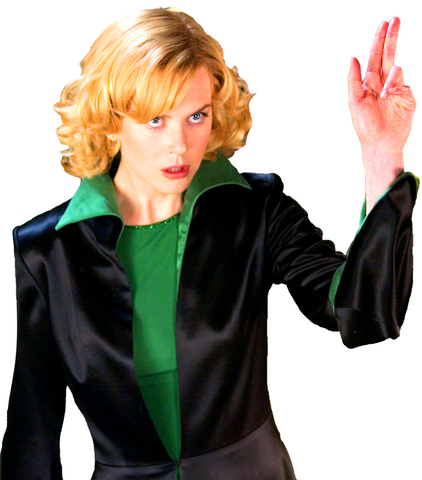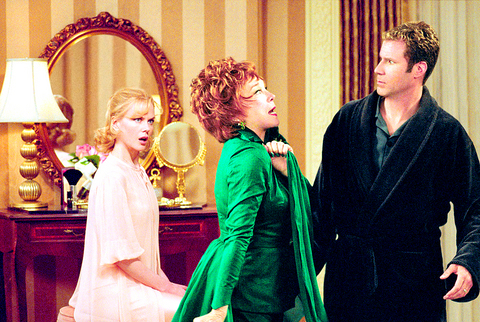Once upon a television time, when witches, genies and homemaker vampires ruled the roost, the war of the sexes was as cute as the button nose on Elizabeth Montgomery's face. As the star of the dimwitted delight Bewitched, Montgomery wiggled her protuberance at a husband whose bumbling ways turned a topical power struggle into the stuff of canned laughter.
For some, 1964 is fondly remembered as the year President Lyndon B. Johnson signed a civil rights act, barring sex discrimination in the workplace, as well as the year Montgomery materialized as the gauzily sexy witch Samantha.
Bewitched is now a big-screen movie with Nicole Kidman, Will Ferrell and a nicely tuned supporting cast. Because the ethereally beautiful Kidman no longer resembles a real person, having been buffed to almost supernatural perfection in the way of most modern stars, casting her as a witch was inspired.

Equally clever is the film's core conceit, which finds her playing Isabel Bigelow, a reluctant witch who is cast as Samantha in a remake of the original sitcom. Anxious to leave behind the world of spells and (especially, it seems) warlocks, Isabel yearns for the simple life, much as Eddie Albert did when he moved next door to a pig on "Green Acres." Instead, the witch becomes a star.
This multisituational silliness is agreeably watchable for an hour. Isabel, having made a vow to go on the witchcraft wagon, settles into a dream of a house complete with a white picket fence, a garlanded lawn and a tortoise-shell cat. Much like other cultural aliens, both extraterrestrial and those fresh off the boat, sweet Isabel is charmingly overwhelmed by her new world.
She relishes the idea of shopping like a mere mortal but doesn't give any thought to how to pay for her groceries. And when she tries to hook up the cable, she (understandably) turns on the charm, so it's no wonder that her father, Nigel (Michael Caine), casts a skeptical eye at his daughter; he seems to know that relinquishing your power is no easy thing.

PHOTO: REUTERS
These early scenes unfold smoothly, and it appears that the director, Nora Ephron, who wrote the screenplay with her sister, Delia Ephron, gave some thought to what it might be like to be a witch who suddenly has to live in the human world.
It's pleasant just to watch Kidman float through the movie's sets like a visitor from another land; she's as adorable as ET, though her voice is as baby-breathy as that of Marilyn Monroe. Kidman has of late become perhaps overly fond of speaking in such undertones (it makes you wonder if she permanently strained her vocal cords), but here the kittenish delivery adds a crucial softness, a sense of comfort, that doesn't come naturally to this actress.
During the first years of Bewitched, Montgomery was one of the era's stealth vixens, a woman whose alert eyes darted under the cover of unthreatening blondeness. Unlike Lucy Ricardo, from whose canyon mouth flowed a river of complaint (and whose restlessness always felt somehow tragic), Samantha really did seem like the girl next door who was happy to become the model wife.
The great joke of Bewitched was that unlike Lucy, Samantha had enormous power but kept it in check to placate her husband, unless it served her purposes. It's a sign of the times -- and perhaps of the fact that women wrote, directed and produced this film -- that Samantha's surrendering her power in a marriage no longer seems as believable as her becoming a celebrity.
The story, such as it is, kicks in when the movie star Jack Wyatt (a relatively unplugged Will Ferrell) tries to kick-start a faltering career by starring in a television redo of Bewitched. Because he's playing Darrin, the witch's genially hapless husband, Jack angles for an unknown as Samantha, the better to hog all the limelight.
He ends up with Kidman's Isabel ostensibly because not a single woman in Los Angeles's vast reservoir of acting talent can wiggle her nose like Elizabeth Montgomery. Yet Isabel is also cute, easily improvises with Jack about witch do's and don'ts (you need a permit for a poisoned apple and so forth) and looks mighty fine on camera, which temporarily works against her when she tests better than Jack with the
audience.
Kidman and Ferrell are not an intuitive match, and the romantic side of the story is both half-hearted and half-baked. But this self-contained actress has rarely come across as relaxed in the company of another performer.
For his part, Ferrell enjoys a few ticklishly funny moments with Kidman and Jason Schwartzman, playing his sycophant manager. And the sight (and sounds) of his biking onto the set while loudly singing his own name has comic tang, as does a more developed scene in which Jack pretends he's insufferably pampered. Ferrell looks more streamlined than he has in the past, perhaps in concession to the story's low-wattage romance, but Nora Ephron's attempts to turn him into Tom Hanks Lite are unfortunate.
Best known for screenplays like When Harry Met Sally and for bowdlerizing Lubitsch's Shop Around the Corner with her execrable You've Got Mail, Ephron is one of those directors whose work is only as good as her cast and crew. Outside of the performers there isn't much to look at here, but given the cavalcade of supporting characters there are some distractions, including Shirley MacLaine, Heather Burns and Stephen Colbert. Along with the two stars, they keep the film in gear until it hits the hour mark, whereupon it dies. (Steve Carell, doing Paul Lynde doing Uncle Arthur, provides some late relief.)
The film's screenwriters conjured up a very clever gimmick when they decided to revamp a favorite 1960s television show. Too bad they forgot that a gimmick is no substitute for a screenplay, never mind a real movie.

June 2 to June 8 Taiwan’s woodcutters believe that if they see even one speck of red in their cooked rice, no matter how small, an accident is going to happen. Peng Chin-tian (彭錦田) swears that this has proven to be true at every stop during his decades-long career in the logging industry. Along with mining, timber harvesting was once considered the most dangerous profession in Taiwan. Not only were mishaps common during all stages of processing, it was difficult to transport the injured to get medical treatment. Many died during the arduous journey. Peng recounts some of his accidents in

“Why does Taiwan identity decline?”a group of researchers lead by University of Nevada political scientist Austin Wang (王宏恩) asked in a recent paper. After all, it is not difficult to explain the rise in Taiwanese identity after the early 1990s. But no model predicted its decline during the 2016-2018 period, they say. After testing various alternative explanations, Wang et al argue that the fall-off in Taiwanese identity during that period is related to voter hedging based on the performance of the Democratic Progressive Party (DPP). Since the DPP is perceived as the guardian of Taiwan identity, when it performs well,

The Taiwan People’s Party (TPP) on May 18 held a rally in Taichung to mark the anniversary of President William Lai’s (賴清德) inauguration on May 20. The title of the rally could be loosely translated to “May 18 recall fraudulent goods” (518退貨ㄌㄨㄚˋ!). Unlike in English, where the terms are the same, “recall” (退貨) in this context refers to product recalls due to damaged, defective or fraudulent merchandise, not the political recalls (罷免) currently dominating the headlines. I attended the rally to determine if the impression was correct that the TPP under party Chairman Huang Kuo-Chang (黃國昌) had little of a

At Computex 2025, Nvidia CEO Jensen Huang (黃仁勳) urged the government to subsidize AI. “All schools in Taiwan must integrate AI into their curricula,” he declared. A few months earlier, he said, “If I were a student today, I’d immediately start using tools like ChatGPT, Gemini Pro and Grok to learn, write and accelerate my thinking.” Huang sees the AI-bullet train leaving the station. And as one of its drivers, he’s worried about youth not getting on board — bad for their careers, and bad for his workforce. As a semiconductor supply-chain powerhouse and AI hub wannabe, Taiwan is seeing